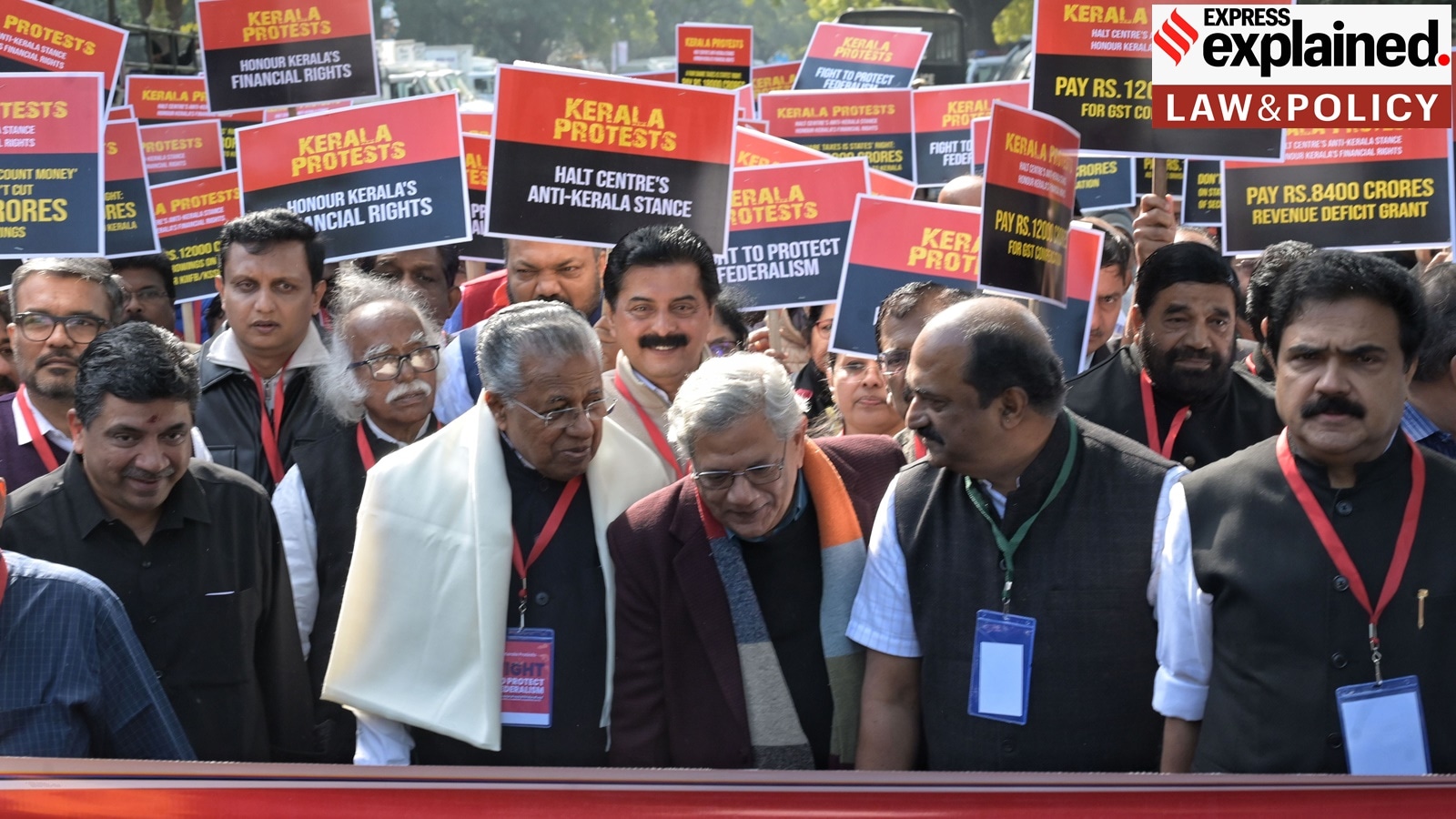Why Kerala and the Centre are in a dispute over state borrowing limits at the SC
Before the SC began hearing the case in February 2024, Kerala CM Vijayan had staged a protest at Jantar Mantar alongside other CMs from Opposition-ruled states, calling the Centre’s actions “politically motivated…against non-BJP-run states”.
 Sitaram Yechury, Pinarayi Vijayan, D. Raja, Farooq Abdullah and other leaders at Jantar Mantar, New Delhi, during a protest against the Central Government on February 8, 2024. (Express photo: Abhinav Saha)
Sitaram Yechury, Pinarayi Vijayan, D. Raja, Farooq Abdullah and other leaders at Jantar Mantar, New Delhi, during a protest against the Central Government on February 8, 2024. (Express photo: Abhinav Saha)For the better part of the past year, the Kerala government has claimed that the central government’s fiscal policies have driven the state towards a financial crisis. In December, the state government filed a suit against the Centre at the Supreme Court and claimed that “if damage is not prevented, the Plaintiff (Kerala) State, with its meagre resources, will not be able to recover from this for decades”, as reported by The Indian Express.
Before the court began hearing the case in earnest in February 2024, Kerala Chief Minister Pinarayi Vijayan staged a protest at Jantar Mantar in the national capital alongside other CMs from Opposition-ruled states, including Arvind Kejriwal (Delhi) and Bhagwant Mann (Punjab). At the protest, Vijayan called the Centre’s actions “politically motivated…against non-BJP-run states”.
Why is Kerala dealing with a financial crunch?
The 15th Finance Commission set the Net Borrowing Ceiling for states at 3% of the Gross State Domestic Product (GSDP) for the 2023-24 financial year. Finance Minister Nirmala Sitharaman clarified in December that this would come up to Rs 32,442 crore for Kerala in the 2023-24 financial year. Kerala, meanwhile, claims that the Centre cut its borrowing limit in May and August of last year, whittling the states’ borrowing limit down to Rs. 15,390 crore.
The Finance Commission, on its part, designated Kerala as a “highly debt stressed” state that often resorts to borrowing from the central government in order to pay for day-to-day expenses such as salaries and pensions. The commission also noted that Kerala spent the second-highest percentage of its total revenue expenditure on salaries, which are continuing to grow.
Kerala claims that the Centre is withholding its due share in taxes. The Indian Express previously reported that the Kerala government, relying on an RBI report on state finances, has claimed that for every Rs 100 in tax collected, the Centre, on average, provides Rs 35 to the states. However, the Kerala government claims that it has only been receiving Rs 21 for every Rs 100 in taxes sent to the Centre.
Further, the Covid-19 pandemic and the cessation of Goods and Services Tax (2017) compensation has negatively impacted revenue collection in Kerala. When GST was introduced in 2017, it was done with the assurance that the Centre would compensate states for the shortfall in revenue collection for the next five years and with the understanding that annual tax growth rates would increase by the end of this period. However, the pandemic put an end to any notions of growth and the GST compensation period ended in June 2022.
The Kerala government approached the Supreme Court in December 2023 arguing that the imposition and reduction of Kerala’s Net Borrowing Ceiling is unconstitutional as “Public Debt of the State” is a subject included in the state list and the central government cannot limit the states’ borrowing capacity. The state government also claimed that Rs 26,000 crore is required immediately in order to avert a financial crisis.
What has the Supreme Court said?
On February 6, Attorney General R Venkataramani submitted a written note to the Supreme Court justifying the Centre’s intervention, stating that “debt of States affects the credit rating of the country” and that “default by any State in debt servicing would create reputational issues and will have domino effect”. He also claimed that the financial stress faced by Kerala was due to its own financial mismanagement.
During the February 13 hearing before a Bench of Justices Surya Kant and KV Vishwanathan, the court recommended that the Centre and the state of Kerala enter into negotiations between their respective finance ministries. Both sides agreed and Senior Advocate Kapil Sibal stated that a delegation from Kerala would be flown in the next day. Justice Kant stressed the importance of a genuine dialogue and stated “Let this not be an empty formality”.
However, on February 19, both parties returned to court having failed to reach a solution despite talks. Sibal said the Centre was reluctant to release the Rs 11,731 crore requested in the interim unless the Kerala government entirely withdrew the suit before the Supreme Court.
The Bench expressed its disapproval, indicating that a condition to withdraw the suit before any money is released would be outside the parameters of the constitution as states had a right to approach the court in the event of a dispute with the Centre under Article 131 of the Constitution.
Sibal maintained that the State of Kerala was entitled to Rs 13,608 crore and required an additional 15,000 crores in order to avert a crisis. Additional Solicitor General N Venkataraman expressed reluctance on behalf on the Centre, stating that if the SC entertained the suit and heard it beyond the request for interim relief, it would set a precedent for other states to approach the court as well leading to a “judicially unmanageable” situation.
On March 13, ASG Venkataraman return to court and stated that the Centre was willing to give Rs 5,000 crore with multiple conditions, including that this amount would be deducted from Kerala’s Net Borrowing Ceiling in the 2024-25 financial year. Sibal, on behalf of Kerala, rejected this offer stating that they were entitled to the money without conditions and that atleast Rs 10,000 crore was required.
The court will continue hearing the case on March 21.
- 01
- 02
- 03
- 04
- 05






































